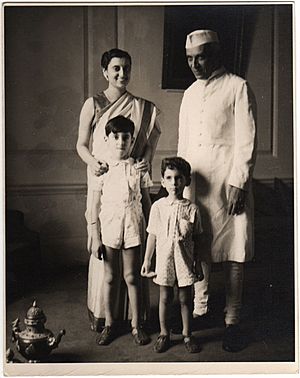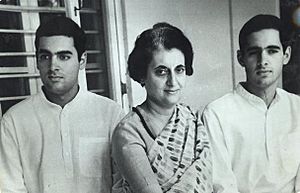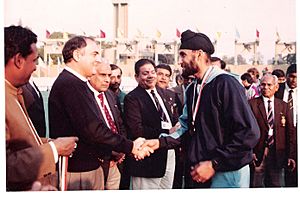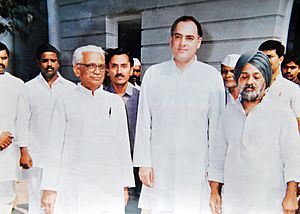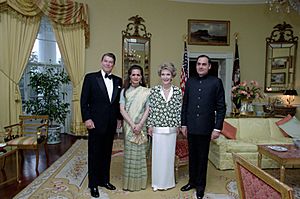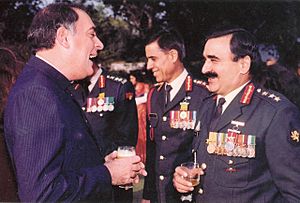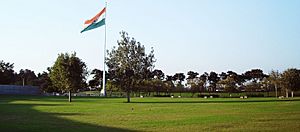Rajiv Gandhi facts for kids
Quick facts for kids
Rajiv Gandhi
|
|
|---|---|
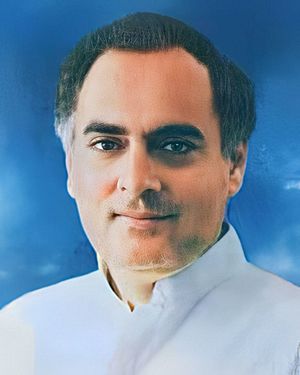 |
|
| 6th Prime Minister of India | |
| In office 31 October 1984 – 2 December 1989 |
|
| President | Zail Singh R. Venkataraman |
| Vice President | R. Venkataraman Shankar Dayal Sharma |
| Preceded by | Indira Gandhi |
| Succeeded by | V. P. Singh |
| Leader of the Opposition, Lok Sabha | |
| In office 18 December 1989 – 23 December 1990 |
|
| Prime Minister | V. P. Singh |
| Preceded by | Jagjivan Ram |
| Succeeded by | L. K. Advani |
| President of the Indian National Congress | |
| In office 28 December 1985 – 21 May 1991 |
|
| Preceded by | Indira Gandhi |
| Succeeded by | P. V. Narasimha Rao |
| Member of Parliament, Lok Sabha | |
| In office 17 August 1981 – 21 May 1991 |
|
| Preceded by | Sanjay Gandhi |
| Succeeded by | Satish Sharma |
| Constituency | Amethi |
| Personal details | |
| Born |
Rajiv Ratna Gandhi
20 August 1944 Bombay, Bombay Presidency, British India (present-day Mumbai, Maharashtra, India) |
| Died | 21 May 1991 (aged 46) Sriperumbudur, Tamil Nadu, India |
| Cause of death | Assassination |
|
Monuments
|
Veer Bhumi
|
| Political party | Indian National Congress |
| Spouse | |
| Relations | See Nehru–Gandhi family |
| Children | |
| Parents |
|
| Alma mater | Trinity College, Cambridge (dropped out) Imperial College London (dropped out) |
| Awards | Bharat Ratna (1991) |
| Signature |  |
Rajiv Gandhi (![]() i/ˈrɑːdʒiːv ˈɡɑːndiː/; 20 August 1944 – 21 May 1991) was an Indian politician who served as the sixth prime minister of India from 1984 to 1989. He took office after the assassination of his mother, then Prime Minister Indira Gandhi, to become the youngest Indian Prime minister at the age of 40.
i/ˈrɑːdʒiːv ˈɡɑːndiː/; 20 August 1944 – 21 May 1991) was an Indian politician who served as the sixth prime minister of India from 1984 to 1989. He took office after the assassination of his mother, then Prime Minister Indira Gandhi, to become the youngest Indian Prime minister at the age of 40.
Gandhi was from the politically powerful Nehru–Gandhi family, which had been associated with the Indian National Congress party. For much of his childhood, his maternal grandfather Jawaharlal Nehru was prime minister. Gandhi attended college at the University of Cambridge in the United Kingdom. He returned to India in 1966 and became a professional pilot for the state-owned Indian Airlines. In 1968, he married Sonia Gandhi; the couple settled in Delhi to a domestic life with their children Rahul Gandhi and Priyanka Gandhi Vadra. For much of the 1970s, his mother Indira Gandhi was prime minister and his brother Sanjay Gandhi an MP; despite this, Rajiv Gandhi remained apolitical. After Sanjay's death in a plane crash in 1980, Gandhi reluctantly entered politics at the behest of Indira. The following year he won his brother's Parliamentary seat of Amethi and became a member of the Lok Sabha—the lower house of India's Parliament. As part of his political grooming, Rajiv was made general secretary of the Congress party and given significant responsibility in organising the 1982 Asian Games.
On the morning of 31 October 1984, his mother (Prime Minister Indira Gandhi) was assassinated by her two Sikh bodyguards Satwant Singh and Beant Singh in the aftermath of Operation Blue Star, an Indian military action to remove Sikh separatist activists from the Golden temple of the Harmandir Sahib. Later that day, Gandhi was appointed prime minister. His leadership was tested over the next few days as organised mobs of Congress supporters rioted against the Sikh community, resulting in anti-Sikh massacres in Delhi. Sources estimate the number of Sikh deaths at about 8,000–17,000. That December, Congress party won the largest Lok Sabha majority to date, 411 seats out of 542. Rajiv Gandhi's period in office was mired in controversies; perhaps the greatest crises were the Bhopal disaster, Bofors scandal and Mohd. Ahmed Khan v. Shah Bano Begum. Soon after installing Gul Shah as Chief Minister in Jammu and Kashmir, the 1986 Kashmir Riots erupted. In 1988, he reversed the coup in Maldives, antagonising militant Tamil groups such as PLOTE, intervening and then sending peacekeeping troops to Sri Lanka in 1987, leading to open conflict with the Liberation Tigers of Tamil Eelam (LTTE). In mid-1987, the Bofors scandal damaged his corruption-free image and resulted in a major defeat for his party in the 1989 election.
Gandhi remained Congress President until the elections in 1991. While campaigning for the elections, he was assassinated. His widow Sonia became the president of the Congress party in 1998 and led the party to victory in the 2004 and 2009 parliamentary elections. His son Rahul Gandhi is a Member of Parliament and was the President of the Indian National Congress till 2019. In 1991, the Indian government posthumously awarded Gandhi the Bharat Ratna, the country's highest civilian award. At the India Leadership Conclave in 2009, the Revolutionary Leader of Modern India award was conferred posthumously on Gandhi.
Contents
Early life and career
Rajiv Gandhi was born in Bombay on 20 August 1944 to Indira and Feroze Gandhi. In 1951, Rajiv and his younger brother Sanjay were admitted to Shiv Niketan school, where the teachers said Rajiv was shy and introverted, and "greatly enjoyed painting and drawing". He was admitted to the Welham Boys' School, Dehradun and Doon School, Dehradun in 1954, where Sanjay joined him two years later. Rajiv was also educated at the Ecole D'Humanité, an international boarding school in Switzerland. He left the Doon School in 1961 with a second-class certificate, having performed well in his final subjects apart from a pass mark in chemistry.
During Gandhi's final year at Doon, his mother and Albert D'Rozario, the scientific attaché at the Indian High Commission in London, arranged his application to Cambridge University. D'Rozario, who had been a college classmate of Feroze Gandhi, recommended that Gandhi should read engineering, and met with Mark Pryor, the Senior Tutor at Trinity College, Cambridge. Pryor arranged for Gandhi's conditional admission to Trinity, contingent on his passing the Mechanical Sciences Qualifying (MSQ) Examination with acceptable marks. After studying for his A-levels at the sixth form college of Davies, Laing & Dick in London, Gandhi sat the MSQ Examination in March 1962 but was unsuccessful. He passed on his second attempt in June, and was admitted to Trinity on 4 September 1962, joining the college in October. While at Trinity, he joined the Cambridge University Boat Club.
During Gandhi's time at Cambridge, his mother and D'Rozario remained concerned about his well-being. D'Rozario, who along with his wife Sophy often hosted Gandhi at their Finchley home, took Gandhi to task for his inattention towards his studies. Despite his support, Gandhi failed end-of-year exams and left Trinity in 1965 without a degree, though he kept in touch with his former mentor in his retirement. In 1966 he began a course in mechanical engineering at Imperial College London, but also failed to complete it. Gandhi really was not studious enough, as he went on to admit later.
Gandhi returned to India in 1966, the year his mother became prime minister. He went to Delhi and became a member of the Flying Club, where he trained as a pilot. In 1970, he was employed as a pilot by Indian Airlines; unlike Sanjay, he did not exhibit any interest of joining politics. In 1968, after three years of courtship, he married Edvige Antonia Albina Màino, who changed her name to Sonia Gandhi and made India her home. Their first child, a son, Rahul Gandhi was born in 1970. In 1972, the couple had a daughter, Priyanka Gandhi, who married Robert Vadra. Gandhi was a friend of Amitabh Bachchan, and was familiar with Bachchan even before he launched his acting career. Rajiv, Sanjay and Bachchan spent time together when Bachchan was student in Delhi University and a resident of New Delhi. In the 1980s, Bachchan would enter politics to support his friend, Gandhi.
Entry into politics
On 23 June 1980, Rajiv's younger brother Sanjay Gandhi died unexpectedly in an aeroplane crash. At that time, Rajiv Gandhi was in London as part of his foreign tour. Hearing the news, he returned to Delhi and cremated Sanjay's body. As per Agarwal, in the week following Sanjay's death, Shankaracharya Swami Shri Swaroopanand, a saint from Badrinath, visited the family's house to offer his condolences. He advised Rajiv not to fly aeroplanes and instead "dedicate himself to the service of the nation". 70 members of the Congress party signed a proposal and went to Indira, urging Rajiv to enter politics. Indira told them it was Rajiv's decision whether to enter politics. When he was questioned about it, he replied, "If my mother gets help from it, then I will enter politics". Rajiv entered politics on 16 February 1981, when he addressed a national farmers' rally in Delhi. During this time, he was still an employee of Air India.
Participation in active politics
On 4 May 1981, Indira Gandhi presided over a meeting of the All India Congress Committee. Vasantdada Patil proposed Rajiv as a candidate for the Amethi constituency, which was accepted by all members at the meeting. A week later, the party officially announced his candidacy for the constituency. He then paid the party membership fees of the party and flew to Sultanpur to file his nomination papers and completed other formalities. He won the seat, defeating Lok Dal candidate Sharad Yadav by a margin of 237,000 votes. He took his oath on 17 August as Member of Parliament.
Rajiv Gandhi's first political tour was to England, where he attended the wedding ceremony of Prince Charles and Lady Diana Spencer on 29 July 1981. In December the same year, he was put in charge of the Indian Youth Congress. He first showed his organisational ability by "working round the clock" on the 1982 Asian Games. He was one of 33 members of the Indian parliament who were part of the Games' organising committee; sports historian Boria Majumdar writes that being "son of the prime minister he had a moral and unofficial authority" over the others. The report submitted by the Asian Games committee mentions Gandhi's "drive, zeal and initiative" for the "outstanding success" of the games.
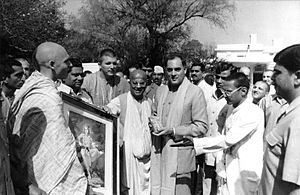
Prime Minister of India
Rajiv Gandhi was in West Bengal on 31 October 1984 when his mother, Prime Minister Indira Gandhi, was assassinated by two of her Sikh bodyguards, Satwant Singh and Beant Singh, to avenge the military attack on the Golden Temple during Operation Blue Star. Sardar Buta Singh and President Zail Singh pressed Rajiv to succeed his mother as prime minister within hours of her murder. Commenting on the anti-Sikh riots in Delhi, Rajiv Gandhi said, "When a giant tree falls, the earth below shakes"; a statement for which he was widely criticised. Many Congress politicians were accused of orchestrating the violence.
Soon after assuming office, Gandhi asked President Singh to dissolve Parliament and hold fresh elections, as the Lok Sabha had completed its five-year term. Gandhi officially became the president of the Congress party, which won a landslide victory with the largest majority in history of the Indian Parliament, giving Gandhi absolute control of government. He benefited from his youth and a general perception of being free of a background in corrupt politics. Gandhi took his oath on 31 December 1984; at 40, he was the youngest prime minister of India. Historian Meena Agarwal writes that even after taking the Prime Ministerial oath, he was a relatively unknown figure, "novice in politics" as he assumed the post after being an MP for three years.
Cabinet ministers
After his swearing-in as prime minister, Gandhi appointed his fourteen-member cabinet. He said he would monitor their performance and would "fire ministers who do not come to the mark". From the Third Indira Gandhi ministry, he removed two powerful figures; Finance Minister Pranab Mukherjee and Railway Minister A. B. A. Ghani Khan Choudhury. Mohsina Kidwai became the Minister of Railways; she was the only female figure in the cabinet. Former Home Minister PV Narasimha Rao was put in charge of defence. V. P. Singh, who was initially appointed as the Finance Minister, was given the Defence Ministry in 1987. During his tenure as prime minister, Gandhi frequently shuffled his cabinet ministers, drawing criticism from the magazine India Today, which called it a "wheel of confusion". The West Bengal chief minister Jyoti Basu said, "The Cabinet change reflects the instability of the Congress (I) Government at the Centre".
Anti-defection law
Gandhi's first action as prime minister was passing the anti-defection law in January 1985. According to this law, an elected Member of Parliament or legislative assembly could not join an opposition party until the next election. Historian Manish Telikicherla Chary calls it a measure of curbing corruption and bribery of ministers by switching parties so they could gain majority. Many such defections occurred during the 1980s as elected leaders of the Congress party joined opposition parties.
1985 Congress Sandesh Yatra
Rajiv Gandhi had announced 'Sandesh Yatra' at the plenary session of AICC in Mumbai in 1985. The All India Congress Seva Dal ran it across the country. Pradesh Congress Committees (PCCs) and party leaders made four simultaneous trips from Mumbai, Kashmir, Kanyakumari and the Northeast. The yatra, which lasted for more than three months, concluded at Delhi's Ramlila Maidan.
Shah Bano case
In 1985, the Supreme Court of India ruled in favour of Muslim divorcee Shah Bano, declaring that her husband should give her alimony. Some Indian Muslims treated it as an encroachment upon Muslim Personal Law and protested against it. Gandhi agreed to their demands. In 1986, the Parliament of India passed The Muslim Women (Protection of Rights on Divorce) Act 1986, which nullified the Supreme Court's judgment in the Shah Bano case. The Act diluted the Supreme Court judgment and allowed maintenance payments to divorced women only during the period of Iddah, or until 90 days after the divorce, according to the provisions of Islamic law. This was in contrast to Section 125 of the Code. Indian magazine Business and Economics called it a minority appeasement by Gandhi. Lawyer and former Law Minister of India, Ram Jethmalani, called the Act "retrogressive obscurantism for short-term minority populism". Gandhi's colleague Arif Mohammad Khan, who was then a Member of Parliament, resigned in protest.
Economic policy
In his election manifesto for the 1984 general election, he did not mention any economic reforms, but after assuming office he tried to liberalise the country's economy. He sought to liberalize India's trade policies but faced stiff opposition to the proposed reforms. He did so by providing incentives to make private production profitable. Subsidies were given to corporate companies to increase industrial production, especially of durable goods. It was hoped this would increase economic growth and improve the quality of investment. Rural and tribal people protested because they saw them as "pro-rich" and "pro-city" reforms.
Gandhi increased government support for science, technology and associated industries, and reduced import quotas, taxes and tariffs on technology-based industries, especially computers, airlines, defence and telecommunications. In 1986, he announced a National Policy on Education to modernise and expand higher education programs across India. In 1986, he founded the Jawahar Navodaya Vidyalaya System, which is a Central government-based education institution that provides rural populations with free residential education from grades six to twelve. His efforts created MTNL in 1986, and his public call offices—better known as PCOs—helped develop the telephone network in rural areas. He introduced measures to significantly reduce the Licence Raj after 1990, allowing businesses and individuals to purchase capital, consumer goods and import without bureaucratic restrictions.
Foreign policy
According to Rejaul Karim Laskar, a scholar of Indian foreign policy and an ideologue of Congress party, Rajiv Gandhi's vision for a new world order was premised on India's place in its front rank. According to Laskar, the "whole gamut" of Rajiv Gandhi's foreign policy was "geared towards" making India "strong, independent, self-reliant and in the front rank of the nations of the world." According to Laskar, Rajiv Gandhi's diplomacy was "properly calibrated" so as to be "conciliatory and accommodating when required" and "assertive when the occasion demanded."
In 1986, by request of the president of Seychelles France-Albert René, Gandhi sent India's navy to Seychelles to oppose an attempted coup against René. The intervention of India averted the coup. This mission was codenamed as Operation Flowers are Blooming. In 1987, India re-occupied the Quaid Post in the disputed Siachen region of the Indo-Pakistani border after winning what was termed Operation Rajiv. In the 1988 Maldives coup d'état, the Maldives president Maumoon Abdul Gayoom asked for help from Gandhi. He dispatched 1500 soldiers and the coup was suppressed.
On Thursday, 9 June 1988, at the fifteenth special session of the United Nations General Assembly, held at Headquarters, New York, Gandhi made vocal his views on a world free of nuclear weapons, to be realised through an, 'Action Plan for Ushering in a Nuclear-Weapon Free and Non-Violent World Order.'
The foiled bid of India recently to enter the Nuclear Suppliers Group, echoed his policy of non-proliferation to be linked to universal disarmament, which the World Nuclear Association refuses to recognise; non-proliferation being seen by India as essentially a weapon of the arms control regime, of the big nuclear powers as United States, Russia, United Kingdom, France, and China.
Pakistan
In February 1987, the Pakistani president Zia-ul-Haq visited Delhi, where he met Gandhi to discuss "routine military exercises of the Indian army" on the borders of Rajasthan and Punjab. Gandhi reciprocated, in December 1988, by visiting Islamabad and meeting the new prime minister of Pakistan, Benazir Bhutto, to reaffirm the 1972 Shimla agreement.
Sri Lanka
The Sri Lankan Civil War broke out with the Liberation Tigers of Tamil Eelam (LTTE), which was demanding an independent Tamil state in Sri Lanka. Gandhi discussed the matter with the Sri Lankan Prime Minister Ranasinghe Premadasa at the SAARC meeting in 1986. In that year, the Sri Lankan army blockaded the Tamil majority district of Jaffna; Gandhi ordered relief supplies to be dropped into the area by parachute because the Sri Lankan navy did not allow the Indian Navy to enter.
Gandhi signed the Indo-Sri Lanka Accord in July 1987. The accord "envisaged a devolution of power to the Tamil-majority areas", dissolved the LTTE, and designated Tamil as an official language of Sri Lanka.
Chanderasekar withdrew the IPKF in 1989.
Assault by Sri Lankan guard
On 30 July 1987, a day after Gandhi went to Sri Lanka and signed the Indo-Sri Lanka Accord, an honour guard named Vijitha Rohana hit him on his shoulder with his rifle; Gandhi's quick reflexes saved him from injury. The guard was then dragged off by his security personnel. The guard said his intention was to kill Gandhi because of "the damage he had caused" to Sri Lanka. Wijemuni was imprisoned for two-and-a-half years for the assault.
Regional issues
Punjab
Soon after assuming office, Gandhi released the leaders of the Akali Dal who had been imprisoned since 1984's Operation Blue Star during Indira Gandhi's prime ministership. He lifted the ban on All India Sikh Students Federation and filed an inquiry into the 1984 Anti-Sikh Riots. He also held a closed-door meeting with senior Akali Dal leaders to find a solution to the Punjab problem. Despite Akali opposition, in January 1985, Gandhi signed the Rajiv-Longowal Accord with Akali leader HS Longowal. Punjab's state assembly election was scheduled in September 1985, but Longowal died and was replaced by Surjit Singh Barnala, who formed the government. After two years, in 1987, Barnala resigned his office because of a breakdown of law and order, leading to the implementation of President's rule in the state.
In May 1988, Gandhi launched the Operation Black Thunder to clear the Golden Temple in Amritsar of arms and gunmen. Two groups called National Security Guard and Special Action Group were created; they surrounded the temple in a 10-day siege during which the extremists' weapons were confiscated. Congress leader Anand Sharma said, "Operation Black Thunder effectively demonstrated the will of Rajiv Gandhi's government to take firm action to bring peace to Punjab".
Northeast India
Gandhi's prime-ministership marked an increase of insurgency in northeast India. Mizo National Front demanded independence for Mizoram. In 1987, Gandhi addressed this problem; Mizoram and Arunachal Pradesh were given the status of states that were earlier union territories. Gandhi also ended the Assam Movement, which was launched by Assamese people to protest against the alleged illegal migration of Bangladeshi Muslims and immigration of other Bengalis to their state, which had reduced the Assamese to a minority there. He signed the Assam Accord on 15 August 1985. According to the accord, foreigners who came to the state between 1951 and 1961 were given full citizenship but those who arrived there between 1961 and 1971 did not get right to vote for the next ten years.
Technology
Gandhi employed former Rockwell International executive Sam Pitroda as his adviser on public information infrastructure and innovation. During Gandhi's time in office, public sector telecom companies MTNL and VSNL was developed. According to Pitroda, Gandhi's ability to resist pressure from multi-national companies to abandon his plan to spread telecommunication services has been an important factor in India's development. According to news website Oneindia, "About 20 years ago telephones were considered to be a thing for the use of the rich, but credit goes to Rajiv Gandhi for taking them to the rural masses". Pitroda also said their plan to expand India's telephone network succeeded because of Gandhi's political support. According to Pitroda, by 2007 they were "adding six million phones every month". Gandhi's government also allowed the import of fully assembled motherboards, which led to the price of computers being reduced. According to some commentators, the seed for the information technology (IT) revolution was also planted during Rajiv Gandhi's time.
Later years
Mass connect programmes though Bharat Yatra
In 1990, Rajiv Gandhi undertook Bharat Yatra through different modes – padyatra, the second class carriage of an ordinary passenger train. He chose Champaran as the starting point for his 'Bharat Yatra'. Rajiv Gandhi started the Sadbhavna Yatra from Charminar in Hyderabad on 19 October 1990.
Allegations of black money
In November 1991, Schweizer Illustrierte magazine published an article on black money held in secret accounts by Imelda Marcos and 14 other rulers of Third World countries. Citing McKinsey as a source, the article stated that Rajiv Gandhi held 2.5 billion Swiss francs in secret Indian accounts in Switzerland. Several leaders of opposition parties in India raised the issue, citing the Schweizer Illustrierte article. In December 1991, Amal Datta raised the issue in the Indian Parliament; the Speaker of the Lok Sabha, Shivraj Patil, expunged Rajiv Gandhi's name from the proceedings. In December 2011, Subramanian Swamy wrote to the director of the Central Bureau of Investigation, citing the article and asking him to take action on black money accounts of the Nehru-Gandhi family. On 29 December 2011, Ram Jethmalani made an indirect reference to the issue in the Rajya Sabha, calling it a shame that one of India's former prime ministers was named by a Swiss magazine. This was met by an uproar and a demand for withdrawal of the remark by the ruling Congress party members.
Funding from KGB
In 1992, the Indian newspapers Times of India and The Hindu published reports alleging that Rajiv Gandhi had received funds from the KGB. The Russian government confirmed this disclosure and defended the payments as necessary for Soviet ideological interest. In their 1994 book The State Within a State, journalists Yevgenia Albats and Catherine Fitzpatrick quoted a letter signed by Viktor Chebrikov, head of the KGB, in the 1980s. The letter says the KGB maintained contact with Gandhi, who expressed his gratitude to the KGB for benefits accruing to his family from commercial dealings of a controlled firm. A considerable portion of funds obtained from this channel were used to support his party. Albats later said that in December 1985, Chebrikov had asked for authorisation from the Central Committee of the Communist Party of the Soviet Union to make payments to family members of Rajiv Gandhi, including Sonia Gandhi and Rahul Gandhi. The payments were authorised by a resolution and endorsed by the USSR Council of Ministers, and had been paid since 1971. In December 2001, Subramanian Swamy filed a writ petition in the Delhi High Court; the court ordered CBI to ascertain the truth of the allegations in May 2002. After two years, the CBI told the Court Russia would not entertain such queries without a registered FIR.
Assassination
Rajiv Gandhi's last public meeting was on 21 May 1991, at Sriperumbudur, a village approximately 40 km (25 mi) from Madras (present-day Chennai), where he was assassinated while campaigning for the Sriperumbudur Lok Sabha Congress candidate.
A state funeral was held for Gandhi on 24 May 1991; it was telecast live and was attended by dignitaries from over 60 countries. He was cremated at Veer Bhumi, on the banks of the river Yamuna near the shrines of his mother Indira Gandhi, brother Sanjay Gandhi, and grandfather Jawaharlal Nehru.
Since his death, 21 May has been declared Anti-Terrorism Day in India.
Institutions named after Gandhi
A Right to Information (RTI) request filed in August 2009 found that more than 450 government projects and schemes are named after the Gandhi-Nehru family. In May 2012, Zee News reported there were 16 government schemes named after Gandhi, including Rajiv Awas Yojana and Rajiv Gandhi Udyami Mitra Yojana. In March 2015, Haryana sports minister Anil Vij said that at that time there were 232 rural stadia in India, with 226 of them being named after him. He said the government was "planning to rename" all the stadia in Haryana state named after him. Vij drew criticism from Congress leader Kuldeep Sharma, who said it was an "insult to their national leaders".
See also
 In Spanish: Rajiv Gandhi para niños
In Spanish: Rajiv Gandhi para niños


